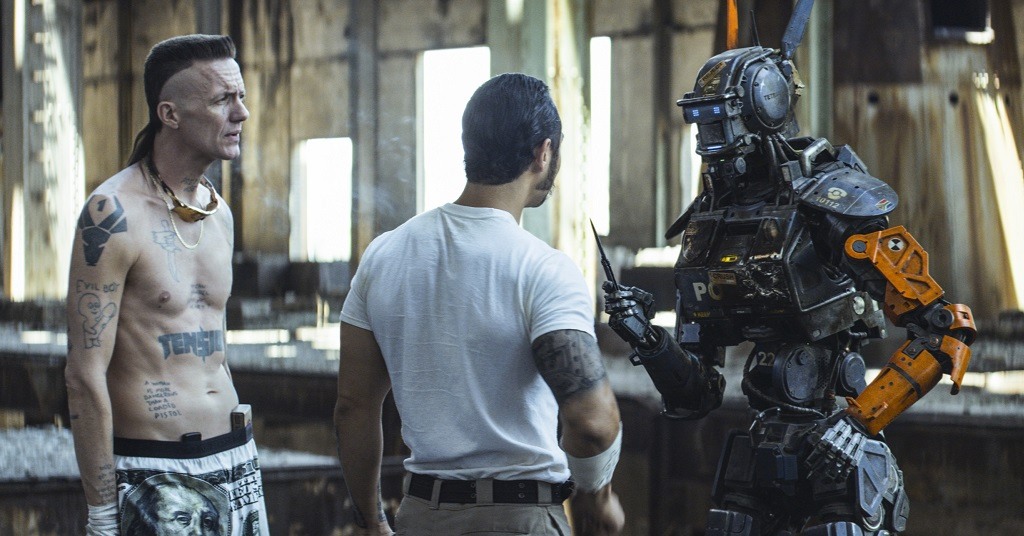“Chappie” (2015)

“Chappie,” directed by Neill Blomkamp and released in 2015, is a thought-provoking science fiction film that delves into themes of artificial intelligence, consciousness, and the ethical implications of technology. Set in a near-future Johannesburg, South Africa, the film centers on the creation and development of Chappie, a sentient robot with the ability to learn and evolve like a human child. As Chappie navigates a world filled with corruption, crime, and conflicting agendas, he becomes a symbol of hope, empathy, and the search for identity in an increasingly mechanized society.
The narrative unfolds with the introduction of Deon Wilson, played by Dev Patel, a brilliant robotics engineer who develops a breakthrough artificial intelligence program intended to bring peace and order to Johannesburg. However, when Deon’s creation of Chappie, voiced and motion-captured by Sharlto Copley, is stolen by a gang of criminals led by Ninja and Yolandi, played by the members of the South African rap-rave group Die Antwoord, Chappie’s development takes an unexpected turn. As he learns about the complexities of human emotions, morality, and the consequences of his actions, Chappie must navigate his own journey of self-discovery and determine his place in a world that fears and misunderstands him.

One of the film’s strengths lies in its exploration of the nature of consciousness and the boundaries between man and machine. Neill Blomkamp’s direction and screenplay, co-written with Terri Tatchell, pose profound questions about what it means to be human and the ethical responsibilities associated with creating artificial intelligence. Through Chappie’s interactions with Deon, Ninja, Yolandi, and the world around him, the film challenges viewers to consider the implications of AI development and the potential consequences of imbuing machines with human-like capabilities.
Moreover, “Chappie” showcases groundbreaking visual effects and motion capture technology that bring the titular character to life with remarkable realism and emotional depth. Sharlto Copley’s performance as Chappie, combined with cutting-edge CGI and animation, imbues the character with innocence, curiosity, and vulnerability, eliciting empathy from audiences despite his mechanical appearance. The film’s dystopian depiction of Johannesburg, marked by societal unrest and technological innovation, provides a stark backdrop for Chappie’s journey of self-awareness and moral awakening.

In addition to its exploration of AI and consciousness, “Chappie” examines themes of redemption, loyalty, and the impact of environment on personal development. As Chappie forms bonds with his unconventional “parents,” Ninja and Yolandi, he learns valuable lessons about love, morality, and the complexities of human behavior. The film’s portrayal of Chappie’s evolution from a naive robot to a sentient being capable of empathy and moral reasoning underscores its exploration of identity and the transformative power of human relationships.
Furthermore, “Chappie” is celebrated for its complex characters and socio-political commentary, addressing issues of inequality, crime, and the abuse of power within a futuristic urban landscape. The film’s ensemble cast, including Hugh Jackman as Vincent Moore, a militant engineer opposed to Deon’s AI program, and Sigourney Weaver as Michelle Bradley, a CEO overseeing the robotics company, adds depth and dimension to its narrative, highlighting the conflicting agendas and moral dilemmas faced by its protagonists.

Critically acclaimed for its bold storytelling, innovative visuals, and thought-provoking themes, “Chappie” received praise for Neill Blomkamp’s visionary direction and the performances of its cast, particularly Sharlto Copley’s nuanced portrayal of the titular character. The film’s ability to blend action-packed sequences with philosophical inquiry resonated with audiences, establishing it as a standout entry in the science fiction genre that challenges conventions and provokes introspection.
In conclusion, “Chappie” (2015) stands as a compelling exploration of artificial intelligence, humanity, and moral complexity in a technologically advanced yet morally ambiguous future. Through its captivating narrative, memorable characters, and cutting-edge visual effects, the film invites viewers to contemplate the ethical implications of AI development and the enduring quest for understanding and acceptance. As Chappie navigates the complexities of his existence and forges his own path in a world rife with challenges, “Chappie” remains a poignant reminder of the power of empathy and the limitless potential of artificial intelligence.











